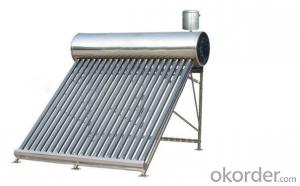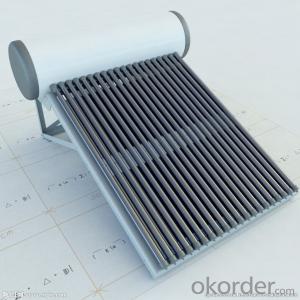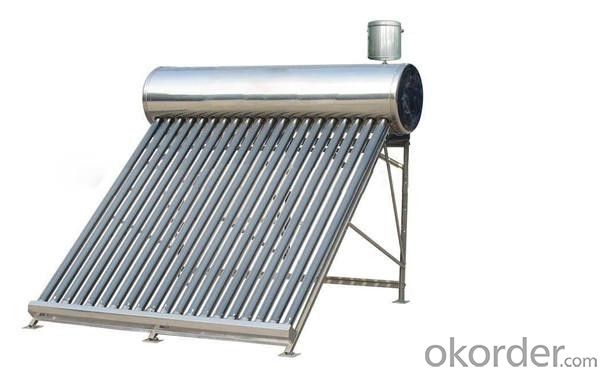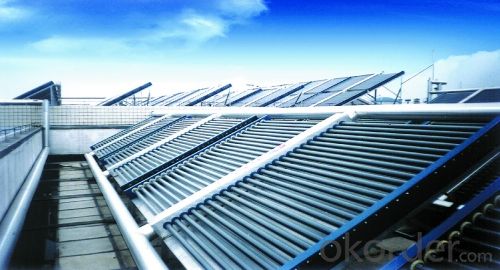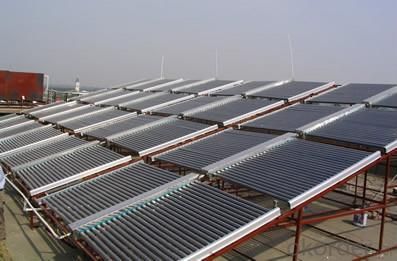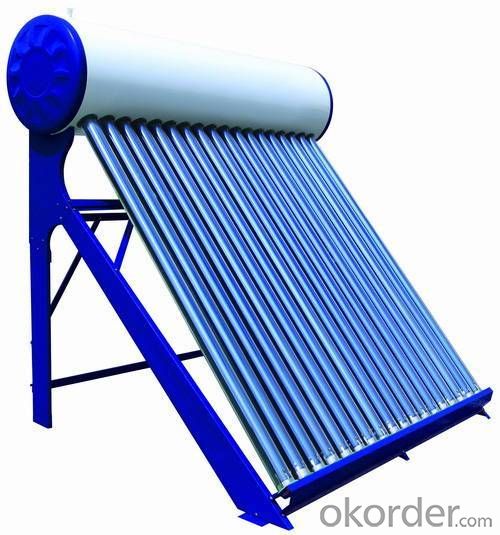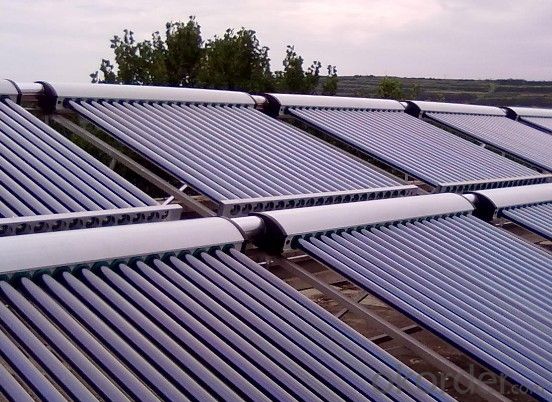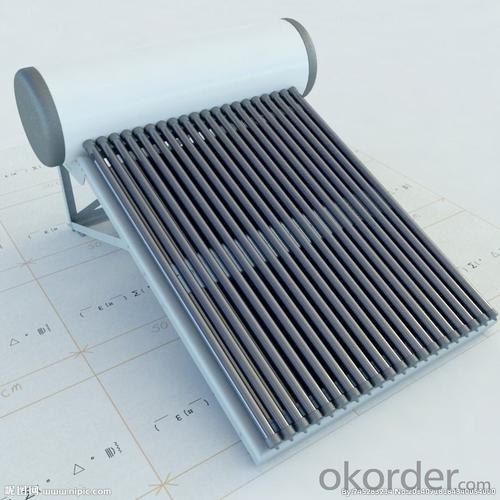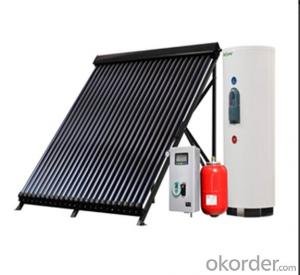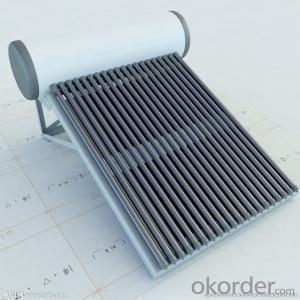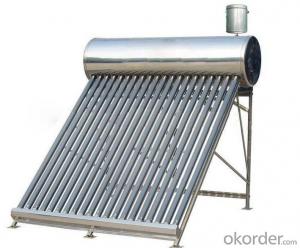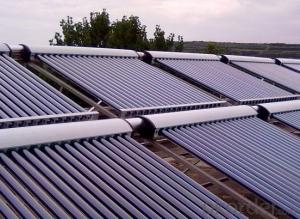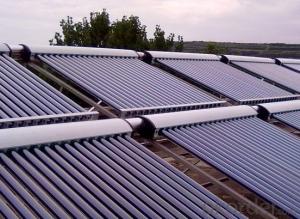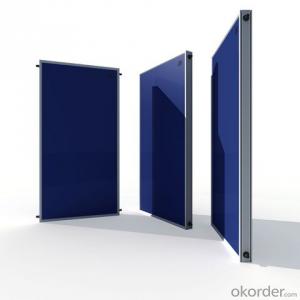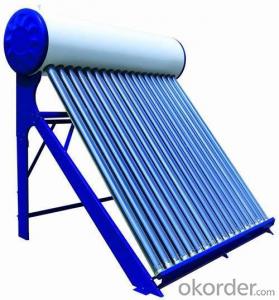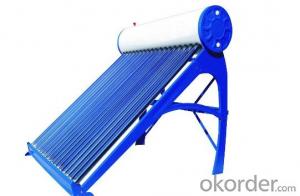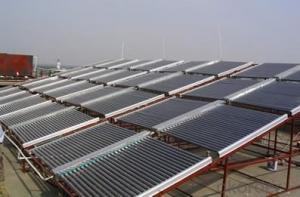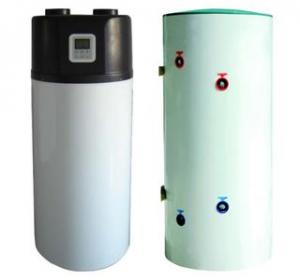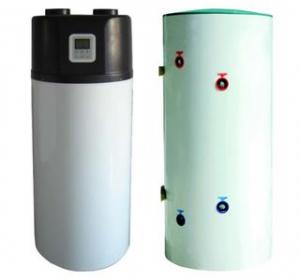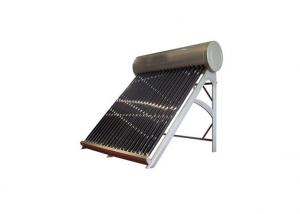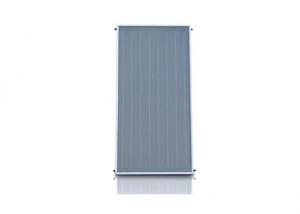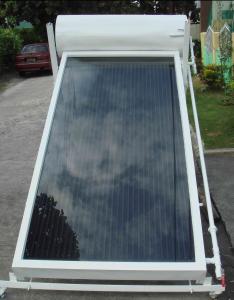Evacuated Tube Solar Water Heater - Freestanding Unpressurized Solar Hot Water System
- Loading Port:
- China main port
- Payment Terms:
- TT OR LC
- Min Order Qty:
- 10 set
- Supply Capability:
- 10000 set/month
OKorder Service Pledge
OKorder Financial Service
You Might Also Like
Introduction of Non-Pressure Solar Water Heater:
Non-pressure Solar Heater is one of the most economical solar water heating device with pretty high efficiency at the same time. It consists of hot water storage tank, solar vacuum tubes with mouth plug in storage tank, and bracket supporting tank and tubes.When cold water in evacuated tubes is heated with solar irradiation, as the specific gravities of hot water and cold water are different, hotter water goes upward to storage tank and colder water goes downward to glass tubes. through this continuous circulation, the cold water in storage tank will be gradually heated till sunset.
Solar water heaters working principle
1. The solar collector absorbs solar energy and transmits it to the solar water heater tank through circulation
2. When the temperature of the collector reaches the set value, the controller starts the circulation pump automatically
3. The circulation pump makes heat-conducting liquid circulate automatically
4. The heat-conducting liquid transfers heat to water by lower heat exchanger in the water tank.
5. When the temperature difference between solar collector and heat pipe solar water heaters tank doesn't reach the set value, the circulation pump will be shut automatically
6. In case the temperature of the water tank does not reach Tmax, Electric Heating Element will start to work automatically
Solar water heaters working station component:
1. Operating screen
2. Manometer
3. Pump speed adjust switches
4. Temperature difference circulation pump
5. Flow rate indicator
6. Return circuit connector
7. Safety valve
Solar water heaters specification:
Description | solar water heaters |
Material of out manifold | 0.55mm thickness color steel/ fluorine carbon steel |
Material of inner tank | Food grade 2.0 mm thickness SUS304 stainless steel |
Tank insulating layer | 40mm 45kg/m³ high-density polyurethane foamed |
Inlet and outlet hole | Male G1'' |
Max pressure | 0.6 Mpa |
Solar collector tube | 3.3 Borosilicate glass with N/Al coating |
Thickness of glass tube | 1.6mm |
Vacuum tube tightness | P≤0.005 Pa |
Absorption | as=0.93-0.96 (AM1.5) |
Emission ratio | εh=0.04-0.06 (80C±5C) |
Idle sunning property parameters | Y=220~260m2.C/KW |
Average heat loss coefficient | ULT=0.6~0.7W/(m2.C) |
Bracket: | 2.0mm thickness aluminum alloy |
Tank weight | 75KGS |
Tank size | 560mm Dia x 1810mm Height |
Tank capacity | 300L |
Solar collector | 2pcs 58x1800x15tube solar collector |
Absorber area | 2.811 m² |
Working station | SP116 working station |
Heat exchanger length | Upper:12m, Underside:18m |
Solar water heaters details show:
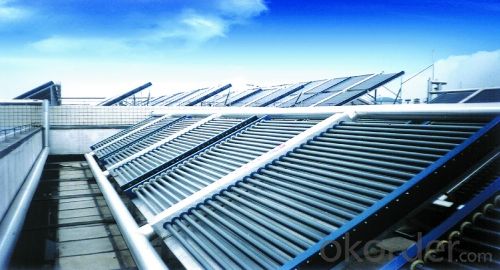
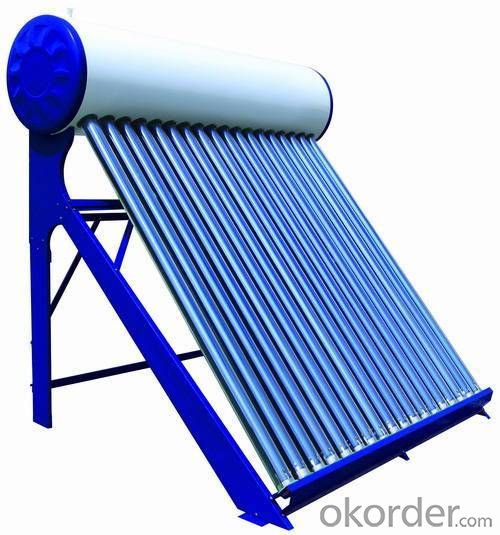
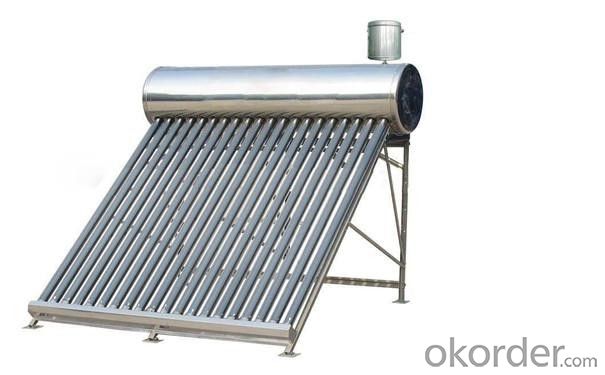
Benefits of this kind of solar water heaters:
1. Prolong the life of your existing water heater
2.Costs less than an electric, gas or oil water heater
3.No maintenance required
4.Lasts longer than a traditional hot water heater
5.Reduce your water heating costs
- Q: Can a solar water heater be used in areas with limited access to government incentives?
- Yes, a solar water heater can still be used in areas with limited access to government incentives. While government incentives can make the installation and maintenance of solar water heaters more affordable, their absence does not prevent the use of this technology. Solar water heaters can still provide energy-efficient and cost-saving benefits in areas without government incentives, helping to reduce energy consumption and lower electricity bills.
- Q: What is the maintenance cost for a solar water heater?
- The maintenance cost for a solar water heater is generally minimal. Routine maintenance, such as cleaning the panels and checking for any leaks or damage, can be done by the homeowner and does not require professional assistance. However, it is recommended to have the system inspected by a professional every few years to ensure optimal performance. Overall, the maintenance cost for a solar water heater is significantly lower compared to traditional water heaters, as there are no fuel costs involved.
- Q: Can a solar water heater be used in cold climates?
- Yes, a solar water heater can be used in cold climates. While the efficiency of the system may decrease in colder temperatures, solar water heaters are designed to work in various climates, including cold regions. They are equipped with insulation and antifreeze mechanisms to prevent freezing and ensure optimal performance even in low temperatures. Additionally, proper installation and sizing of the system can help maximize its efficiency in colder climates.
- Q: Solar water heater should be simple to work about twenty words
- The vacuum tube is the core of the solar water heater, his structure is like an elongated thermos bottle container, vacuum between the inner and outer layers. The surface of the inner glass tube is coated with a selective absorption coating by a special process to absorb the solar radiation energy. By sunlight, the photon impact coating, solar energy into heat energy, water absorption from the outside of the coating, the water temperature increases, the density decreases, hot water upward movement
- Q: When is the best solar water
- Exceptional case:1, if the water storage bucket is empty, the water inside the heating tube is easy to evaporate, heat caused by dry combustion temperature rises sharply, affect the service life, and if this water will lead to tube burst. After midnight water injection.2, the initial installation, it is best to choose the sun is not strong time, such as early morning, evening, cloudy days.
- Q: Solar water heater vacuum tube length?
- Now most of the use of 1 m length of 8. Solar energy is used to heat water by using the heat of ultraviolet rays
- Q: What is the impact of water flow rate on the performance of a solar water heater?
- The impact of water flow rate on the performance of a solar water heater is significant. A higher flow rate can effectively transfer more heat from the solar collectors to the water, resulting in faster heating and higher overall efficiency. However, excessively high flow rates can lead to reduced heat transfer efficiency and potential system malfunction. Conversely, lower flow rates may increase heat transfer efficiency but at the cost of slower heating and reduced overall performance. Therefore, finding the optimal water flow rate is crucial for maximizing the performance of a solar water heater.
- Q: How much water can a solar water heater heat in a day?
- The amount of water that a solar water heater can heat in a day depends on various factors such as the size and efficiency of the system, the weather conditions, and the water demand. On average, a typical solar water heater can heat around 40-80 gallons (150-300 liters) of water per day. However, this can vary significantly and it's important to consider the specific specifications of the solar water heater being used.
- Q: What is the average payback period for a solar water heater in different regions?
- The average payback period for a solar water heater can vary depending on several factors such as the initial cost of installation, local energy prices, available incentives, and regional climate conditions. Generally, the payback period for a solar water heater ranges from 2 to 7 years. However, it is important to note that this can differ significantly between regions, with some areas experiencing shorter payback periods due to higher solar radiation and lower energy costs, while others may have longer payback periods.
- Q: I spent ten years of solar energy, just a few days ago to find someone to deal with the scale, but still not hot, some people know what the reason
- In addition, if the water feeding mode is automatic, to see whether there is water tank Water Leakage problem, if there is Water Leakage fault, the tank slowly go out Water Leakage, and tap water has continued to add cold water to the water tank, the water in the tank will not hot.
Send your message to us
Evacuated Tube Solar Water Heater - Freestanding Unpressurized Solar Hot Water System
- Loading Port:
- China main port
- Payment Terms:
- TT OR LC
- Min Order Qty:
- 10 set
- Supply Capability:
- 10000 set/month
OKorder Service Pledge
OKorder Financial Service
Similar products
Hot products
Hot Searches
Related keywords
